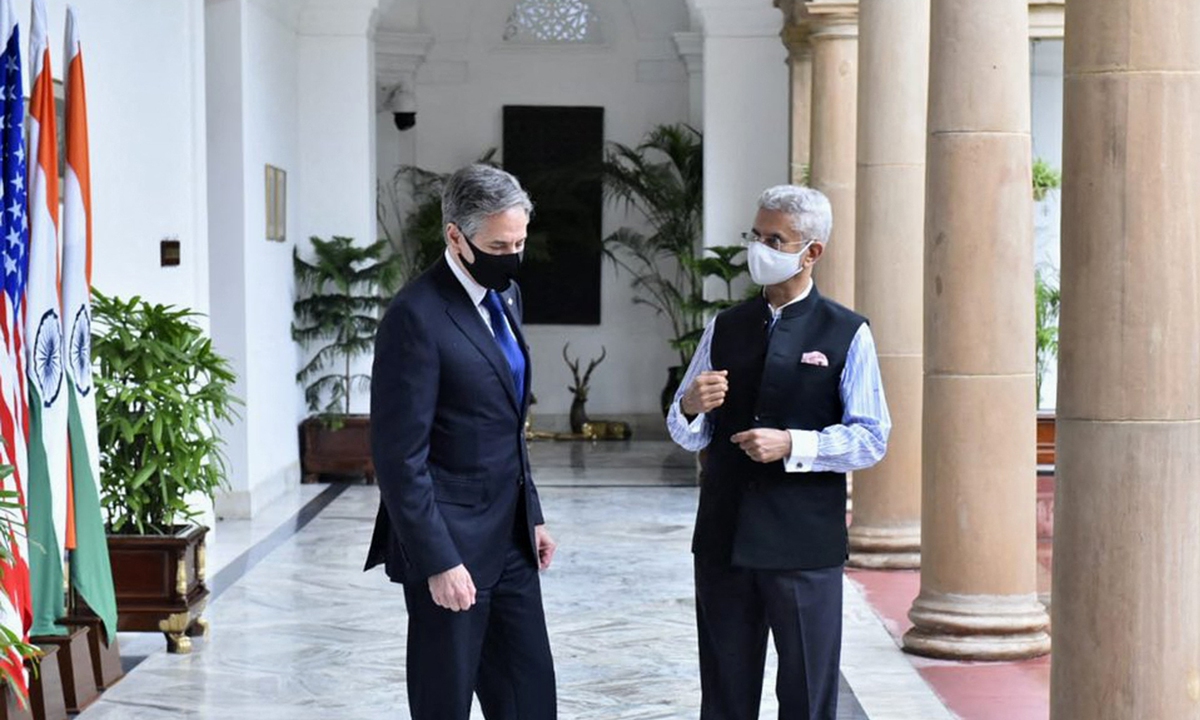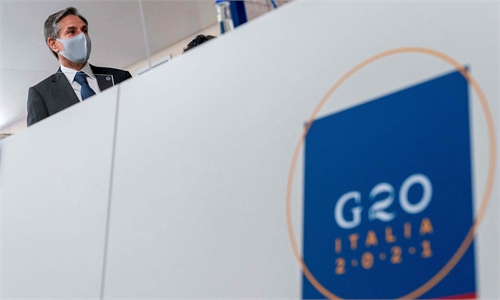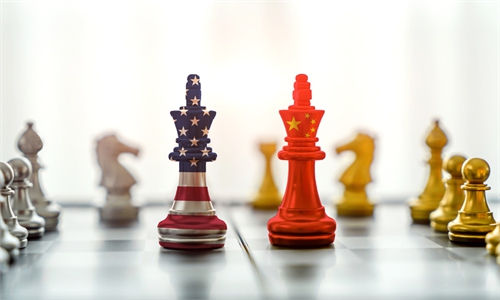‘Dangerous path’ for New Delhi to lean on Washington
Blinken’s trip exposes US’ two-faced China policy: expert

Indian Minister of External Affairs Subrahmanyam Jaishankar (right) welcomes US Secretary of State Antony Blinken at Hyderabad House in New Delhi ahead of a meeting on Wednesday. Photo: AFP
The visit of US Secretary of State Antony Blinken to India on Wednesday exposed Washington's two-faced China policy, as he highlighted threat posed by Beijing during his meetings with Indian leaders and officials, including Prime Minister Narendra Modi, Minister of External Affairs Subrahmanyam Jaishankar and National Security Advisor Ajit Doval, while playing the "Tibet card" by meeting a representative from the so-called Tibetan government-in-exile.Blinken's visit came shortly after US Deputy Secretary of State Wendy Sherman held talks with Chinese senior diplomats in North China's Tianjin two days ago, seeking to keep the channels of communication open amid fraught China-US relations, while Defense Secretary Lloyd Austin said in Singapore on Tuesday the US is committed to "constructive, and stable" ties with China, seeking no confrontation but "will not flinch" when its interests are threatened.
Blinken stressed the Biden administration's determination to strengthen US-India relations during his talks with Jaishankar on Wednesday, saying in a tweet that the US and India "share a commitment to democratic values," which is also part of the bedrock of the bilateral relationship.
In a move that aims at further provoking China, Blinken also met Ngodup Dongchung, a representative of the Dalai Lama during a meeting with civil society leaders on Wednesday, Reuters reported, describing it as the most significant contact with the so-called Tibetan government-in-exile since the Dalai Lama met then-president Barack Obama in Washington in 2016.
Contradicting goodwill rhetoric to China, Blinken's visit to India demonstrated the US' intention of roping in India in containing China is clear and won't change, some experts said, warning that by siding with the US, India would lose its strategic independence, which is dangerous and not in line with its interests.
China tops the agenda
Jaishankar highlighted the cooperation between the two countries on fighting the COVID-19 pandemic, stressing cooperation between India and US under the Quadrilateral Security Dialogue, also known as Quad, with the Biden administration describing India as a "leading global power and a vital US partner" in the Indo-Pacific and beyond, which is seen as a clear reflection of Washington's intention to counter China.
Though the Quad is not a formal military alliance like NATO, it's increasingly viewed by many as a mechanism to contain China in the Indo-Pacific region, and given border tensions with China and the rampage of the epidemic in the country, India has sought to strengthen its partnership with the US, especially in military and anti-epidemic work, which may hinder thaw of India-China ties, experts warned.
"Since the China-India border tension last year, there have been rising anti-China voices and advocacies in India, urging it to further side with the US in countering China, or taking the US as an important bargaining chip in handling the India-China relationship," Qian Feng, director of the research department of the National Strategy Institute at Tsinghua University, told the Global Times on Wednesday.
Indian media Livemint reported on Wednesday that Blinken was scheduled to meet Indian officials and India's border tensions with China is on their agenda. There were also voices urging India to join US to better contain China's development, which Chinese experts regarded as apparently fawning on the US.
Viewed as a dangerous move if walking down this path, New Delhi has been echoing Washington's policy and agenda lately, which however sparked opposition among Indian scholars and strategists, as voices also emerged calling for India to maintain strategic independence for its long-term national interests, Qian said.
Some Indian media also questioned whether a coalition to counter China formed by the US and India could be implemented, and how long such partnership could be maintained.
"The US will inevitably increase efforts to align India, and in return, India will seize the opportunity to use the US to realize its own interests. But considering their pragmatic position and different national interests, the two countries will not establish alliance in the short term, and cannot even reach a degree of quasi-alliance," Tian Guangqiang, assistant research fellow with the National Institute of International Strategy at the Chinese Academy of Social Sciences, told the Global Times on Wednesday.
On the day Chinese State Councilor and Foreign Minister Wang Yi met with Taliban delegation from Afghanistan in Tianjin on Wednesday, Blinken met Doval to exchange views on the situation in Afghanistan. It's worth noting that China holds a different view with the US and India on pushing forward a peaceful reconciliation process in Afghanistan, Tian noted.
"China has a more neutral attitude, hoping that the situation becomes stable in the country. But India keeps an eye on regional conflicts to maintain its hegemony in the South Asia, so it expects a pro-India government to be established in Afghanistan," he said.
However, China has no bias toward any party in this process, which is different from countries like the US and India, who play petty tricks behind certain group for their own interests that will only lead to more chaos in Afghanistan, he said.
Playing Tibet card
During his visit, Blinken met the representative of the Dalai Lama, which further showed the Biden administration's true intention of seeking an all-out effort to contain China, experts said.
"The US says one thing but does another," Wu Xinbo, director of the Center for American Studies at Fudan University in Shanghai, told the Global Times on Wednesday.
"As a result, we should not be surprised at what Blinken did and said during his visit to India, as his activities completely adhere to the US' strategic need to contain China," he said.
It was also the first time a high-level US official met a representative from the so-called Tibetan government-in-exile in a third country, showing that the Biden administration would seize any opportunity to contain and provoke China, Qian said, noting that it won't change in the near future.



